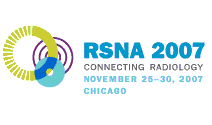
Abstract Archives of the RSNA, 2007
LL-CH3349
Nonspecific Interstitial Pneumonia (NSIP) Radiologic, Clinical, and Pathologic Characteristics
Education Exhibits
Presented in 2007
 Selected for RadioGraphics
Selected for RadioGraphics
Seth Kligerman MD, Presenter: Nothing to Disclose
Kevin K. Brown MD, Abstract Co-Author: Nothing to Disclose
Steve Groshong MD, Abstract Co-Author: Nothing to Disclose
Sahin Hakin MD, Abstract Co-Author: Nothing to Disclose
David Augustine Lynch MB, Abstract Co-Author: Consultant, Actelion Ltd, Allschwil, Switzerland
Consultant, InterMune, Inc, Brisbane, CA
1. Understand the clinical importance of NSIP. 2. Describe the pathologic features of NSIP, with radiologic correlation. 3. Illustrate the imaging characteristics of NSIP, the differential diagnosis, and common pitfalls in making this HRCT diagnosis.
Introduction. Clinical:Clinical Presentation, differential diagnosis, and survival differences. Pathology: Cellular NSIP & Fibrotic NSIP; Pathologic differential diagnosis.
Radiology: High Resolution CT (HRCT) findings; Identifiable patterns; Differential Diagnosis; Problems in Diagnosis:Spectrum of appearance;
Inter-observer variation; Multidisciplinary consensus as gold standard. Summary
1. NSIP has two main forms, cellular and fibrotic. 2. Survival significantly differs between these two forms. 3. NSIP is most often characterized by lower lobe predominant ground glass opacity, with varying degrees of reticulation, traction bronchiectasis, and lower lobe volume loss. Honeycombing does not exclude NSIP. 4. NSIP can be idiopathic or secondary to various disorders. 5. Radiologic and clinical findings can lead to a change in the pathologic diagnosis in up to 19% of cases.
Kligerman, S,
Brown, K,
Groshong, S,
Hakin, S,
Lynch, D,
Nonspecific Interstitial Pneumonia (NSIP) Radiologic, Clinical, and Pathologic Characteristics. Radiological Society of North America 2007 Scientific Assembly and Annual Meeting, November 25 - November 30, 2007 ,Chicago IL.
http://archive.rsna.org/2007/5001392.html


 Selected for RadioGraphics
Selected for RadioGraphics